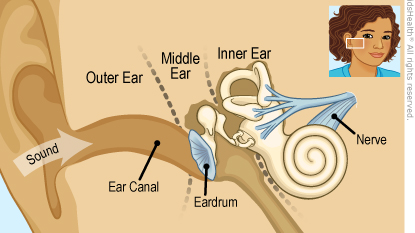Conductive hearing loss happens when sound is blocked from getting to the inner ear. It can make sounds and voices sound muffled, and soft sounds hard to hear. Treatment depends on what is causing the conductive hearing loss.




What causes conductive hearing loss? Causes of conductive hearing loss include:
What is the treatment for conductive hearing loss? Treatment depends on the cause of the hearing loss. A child with an ear infection may need antibiotics. If there's too much earwax, the health care provider may remove it. Sometimes surgery is done to drain fluid from the middle ear. Conductive hearing loss usually gets better after the cause is found and treated.
Can conductive hearing loss lead to other problems? A child who does not hear well may have speech and learning problems. It also can be hard to talk to and be with friends. Identifying hearing loss and getting help early is the best way to prevent these problems.